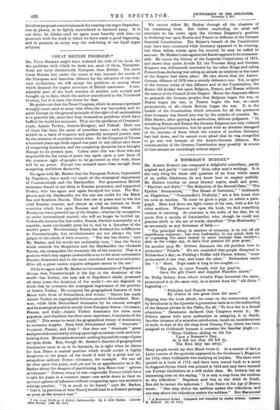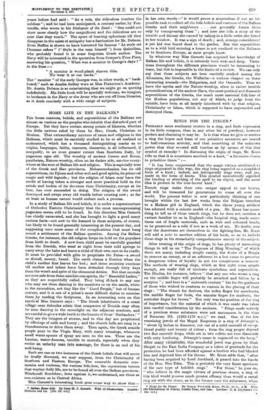A BOOKMAN'S BUDGET.•
Mn. Aesms Densest has composed a delightful miscellany, partly original and partly " conveyed " from other men's writings. It is the very thing for those odd quarters of an hour which many of us, unlike Gladstone, do not know how to employ usefully. Mr. Dobson touches on many literary topics, small and great. " Flaubert and Style," "The Seduction of the Second-Class," "The Epithet ' Sentimental,' " " The Dread of Imitation," " Goldsmith on Plagiarism," " Guiceiardini's Prolixity," are a few items that we note at random To some ho gives a page, to others a para- graph. Hero and there are light versos of his own, with a few by other authors. Wherever we open the book, wo find something curious or amusing. As economy is the order of the day, let us quote first a maxim of Guieciardini, who, though he could not practise thrift in the use of words, described " True Husbandry " as accurately as any Scotsman of fable :-
" The principal thing, in matters of economy, is to cut off all superfluous expenses ; but true husbandry, in nay mind, (loth lie in expending the same money to more vantage than another ; and, ae the vulgar say, to have four pennies for your groat."
On another page Mr. Dobson discusses the old problem how to pronounce " Pamela." We are reminded that people disagreed in Richardson's day ; as Fielding 's Pedlar told Parson Adams, " some pronounced it one way, and some the other." Richardson made the " e " short. Popo made it long in his couplet :- " The gods, to curse Pamela with her pray're, Gave the gilt Coach and dappled Flanders mares." Sir Philip Sidney, from whose Arcadia Pope borrowed the name pronounced it in the same way, as is known from his " old dittie , beginning :— " Philocloa and Pamela sweet By chance in one great hoes did meet."
Dipping into the book afresh, we come on the controversy raised by Swhiburne in the Spectator a generation back as to the authorship of the famous phrase in the Tatter, No.99, "To love her is a liberal education." Swinburne declared that Congreve wrote it ; Mr. Dobson agrece with most authorities in assigning it to Steele. Another instance of a mistaken attribution, based on considerations of style, is that of the old chap-book Tommy Trip, which has been assigned to Goldsmith because it contains the familiar jingle :— " Three Children eliding on the Ice Upon a Summer's Day, As it fell out they All fell in, The Rest they ran away."
Many people would say that Hood wrote it. As a matter of fact, a Latin version of the quatrain appeared in the Gentieniaree Magazine for 1754, when Goldsmith was studying at Leyden. The lines were quoted in a book of 1713, and have been traced back to a story in doggerel rhyme which was printed in 1653 and may have amused our Puritan forefathers at a still earlier date, Mr. Dobson has an interesting note on the saying, " It is only a step from the sublime to the ridiculous." Napoleon said this to the Abbe de Pradt. But did he invent the aphorism f Tom Paine in hie Ape of Reason wrote : " One step above the sublime makes the ridiculous, and one step above the ridiculous makes the sublime." But Marmontel • A Boalouneo Ended. Comp.:sal sad Compiled by Amend Dobson. leneort: S. Mired. 1St ed. sew years hefore had said : " As a rule, the ridiculous touches the sublime "; and he had been anticipated, a century earlier, by Fon- tenolle, who wrote in his Dialogues of the Dead : "One could not show more clearly how the-magnificent and the ridiculous are so near that they touch." The sport of hunting aphorisms till they disappear 'lithe mists of antiquity has a fascination for Mr. Dobson. Even Buffon is shown to have borrowed his famous " Le style eel l'honitne niihne " (" Style -is the man himself ") from Quintilian' who probably found it in some forgotten Greek author. The Navy will be interested in the quotation from Cowper 's Time Pierre, answering his question, " What was a monitor in George's days " in the lines :—
" A monitor is wood-plank shaven thin. We wear it at our books."
The " monitor " of the early Georges was, in other words, a " back- board," such as Amelia Sedley wore at Mina Pinkerton's Academy. Mr. Austin Dobson is so entertaining that we might go on quoting indefinitely. His little book will be specially welcome, we imagine. to bookmen in:the Navy or the Army who are cut off from libraries, as it deals concisely with a wide range of subjects.















































 Previous page
Previous page